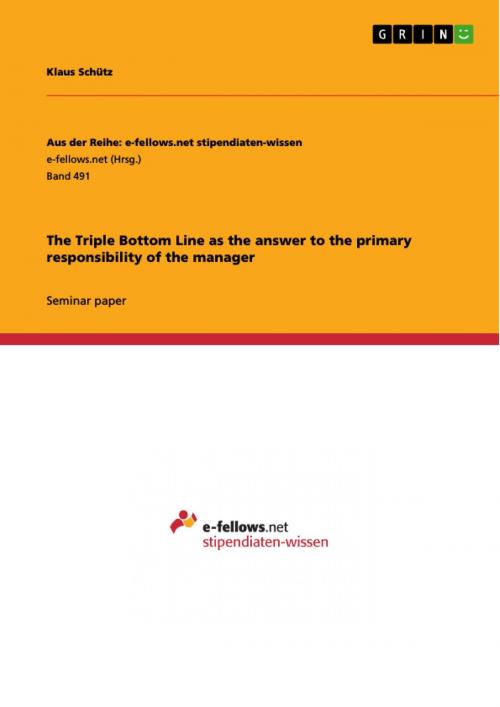The Triple Bottom Line as the answer to the primary responsibility of the manager
Business & Finance, Management & Leadership, Management| Author: | Klaus Schütz | ISBN: | 9783656250920 |
| Publisher: | GRIN Publishing | Publication: | August 2, 2012 |
| Imprint: | GRIN Publishing | Language: | English |
| Author: | Klaus Schütz |
| ISBN: | 9783656250920 |
| Publisher: | GRIN Publishing |
| Publication: | August 2, 2012 |
| Imprint: | GRIN Publishing |
| Language: | English |
Seminar paper from the year 2011 in the subject Business economics - Business Management, Corporate Governance, grade: A, Union Graduate College, course: Managing Ethically in a Global Environment, language: English, abstract: What is the primary responsibility of a manager? This question is an old one. However, in the light of several incidents in recent years - some examples are the financial crisis, the BP oil spill and the Enron scandal - it seems to be a more a present-day problem than ever before. The traditional answer to it is also mirrored in business law and states that managers are agents of the stockholders and work solely for their benefit. This view is commonly referred to as the stockholder view. The contrary position to this is the stakeholder view. It asserts that in addition to stockholders, managers have also a fiduciary duty to employees, customers and other stakeholders, including the stockholders. In this paper, arguments both for and against each view will be presented. It will also be claimed that acting in strict accordance to one of the theories is an inappropriate way of managing a company, for ethical and practical reasons. Rather, the opposing views do not necessarily exclude each other. A synthesis of the two contrasts is not impossible, as it can be seen in the recently developed concept of the Triple Bottom Line.
Seminar paper from the year 2011 in the subject Business economics - Business Management, Corporate Governance, grade: A, Union Graduate College, course: Managing Ethically in a Global Environment, language: English, abstract: What is the primary responsibility of a manager? This question is an old one. However, in the light of several incidents in recent years - some examples are the financial crisis, the BP oil spill and the Enron scandal - it seems to be a more a present-day problem than ever before. The traditional answer to it is also mirrored in business law and states that managers are agents of the stockholders and work solely for their benefit. This view is commonly referred to as the stockholder view. The contrary position to this is the stakeholder view. It asserts that in addition to stockholders, managers have also a fiduciary duty to employees, customers and other stakeholders, including the stockholders. In this paper, arguments both for and against each view will be presented. It will also be claimed that acting in strict accordance to one of the theories is an inappropriate way of managing a company, for ethical and practical reasons. Rather, the opposing views do not necessarily exclude each other. A synthesis of the two contrasts is not impossible, as it can be seen in the recently developed concept of the Triple Bottom Line.















